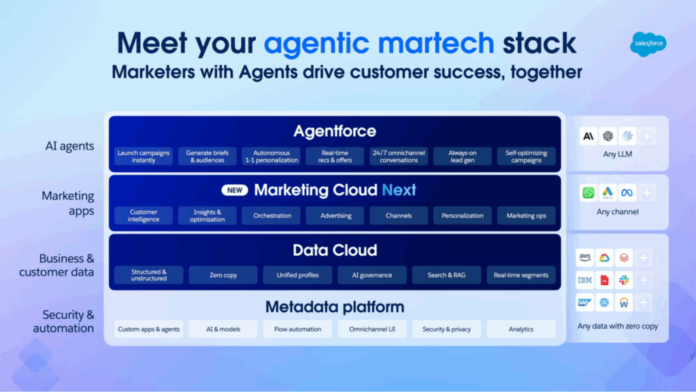Salesforce has unveiled Marketing Cloud Next, a major upgrade to its flagship platform that introduces autonomous AI agents designed to independently manage and optimise B2B marketing campaigns.
The launch signals the company’s shift from AI-enhanced features to what it calls agentic marketing – where AI handles entire workflows, not just individual tasks.
At the heart of the upgrade is Agentforce, a new engine that enables marketers to input a business goal and have the system build and execute a full-funnel campaign. This includes briefing, segmentation, journey orchestration, real-time engagement, and performance optimisation – potentially within hours.
From task automation to autonomous execution
Unlike conventional tools that layer AI on top of existing workflows, Marketing Cloud Next embeds AI agents directly into the Salesforce platform, enabling what the company describes as fully autonomous operations. Marketers remain in control, but the agents can proactively manage outreach and execution across email, web, SMS and paid media channels.
“We’re delivering a complete agentic marketing solution,” said Steve Hammond, EVP and GM of Marketing Cloud. “Agentforce transforms how work gets done, but it doesn’t replace marketers. It offloads repetitive tasks so they can focus on strategy and creativity.”
Key features for B2B marketers
For B2B teams looking to scale personalised engagement and streamline demand generation, Marketing Cloud Next includes several notable capabilities:
-
AI-driven campaign creation: Marketers can define a goal, and the platform generates campaign briefs, segments, messaging, and journey logic. It pulls from both structured and unstructured data sources, including Google Drive, SharePoint and Zendesk.
-
Autonomous engagement: Two-way communications are supported across channels, replacing static “do-not-reply” messages with real-time, personalised interactions. Agents can escalate to human reps when needed.
-
Lead qualification: AI agents manage prospect communication, qualify leads, and schedule meetings — streamlining the handoff from marketing to sales while ensuring consistent brand oversight.
-
Performance optimisation: Agents monitor campaign outcomes, pause underperforming assets, and suggest changes to targeting and creative based on live data. A new Segment Intelligence feature identifies high-performing audience groups.
Rollout and licensing
Several Agentforce capabilities are available now, including tools for campaign creation, lead management, personalisation, and media optimisation. Additional updates are expected later this year, including new Marketing Cloud+ SKUs in July and expanded integration with LinkedIn in November.
Existing Salesforce Marketing Cloud customers can access the new features through the updated Marketing Cloud+ licensing model.
What it means for B2B marketers
For B2B marketing teams grappling with long buying cycles, complex stakeholder groups, and mounting pressure to prove ROI, Marketing Cloud Next offers a data-driven way to reduce execution time and boost personalisation at scale. Salesforce’s emphasis on full campaign automation – not just assistance – positions it among the most ambitious generative AI plays currently available in the martech space.
While the human element remains essential, Salesforce’s bet is clear: autonomous agents will soon become core collaborators in the marketing function. For B2B leaders, the question is no longer whether to use AI — but how much to hand over.
Want the latest B2B marketing news straight to your inbox? Subscribe to our free weekly newsletter!
Interested in sales, marketing or business skills courses and training? Check out our training partner, Learning Room.


 Whether you want to learn how to use LinkedIn, X or Facebook for marketing, or need to brush up on business skills like leadership, presentation skills or managing meetings, you will find something to enhance your professional skills with these on-demand courses.
Whether you want to learn how to use LinkedIn, X or Facebook for marketing, or need to brush up on business skills like leadership, presentation skills or managing meetings, you will find something to enhance your professional skills with these on-demand courses.